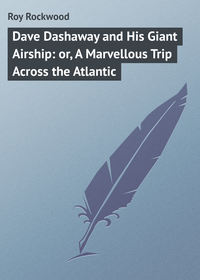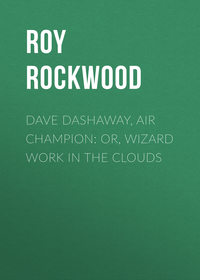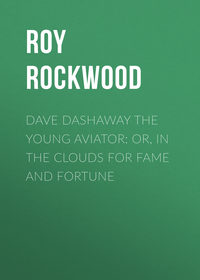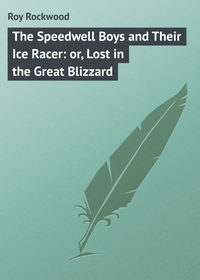 полная версия
полная версияDave Dashaway Around the World: or, A Young Yankee Aviator Among Many Nations
The biplane started first from the ground. In the clear moonlight its course was not difficult to follow. Soon the leader and its consort were started on a steady course, due west. Hiram was in gay humor. Dave had explained the details of his encounter with the enemy, and the new pilot of the pirate airship chuckled as he drove it forward.
The incident had fully awakened Elmer, and Dave found him good lively company. There was a rare spice of adventure in the incident of the night.
“You handled things just grand,” voted Dave’s enthusiastic admirer. “I wonder how those fellows are feeling just about this time?”
It was after midnight when the young aviator directed his companion to take the distance record.
“Ninety-seven miles,” reported Elmer.
“I guess that will do,” said our hero. “We are going to land.”
A pleasant stretch of forest glade looked inviting. The Comet came to anchor. In about ten minutes the other machine made an easy descent almost at the side of the Comet.
“Well done, Hiram,” commended his friend, warmly. “Your lessons under old John Grimshaw are bringing famous results.”
“Glad you think so,” answered Hiram, with affected indifference, but he looked both pleased and proud.
“It’s about midnight,” said Dave. “We will turn in soon as we can, fellows. I will take the first watch.”
“Going to stay here until daylight?” inquired Hiram.
“Yes, and for a good breakfast,” replied the young airman. “We need the rest, and there is little likelihood of our enemies catching up with us now.”
“I should say not,” echoed Hiram with a chuckle.
“No, you have spiked their guns for keeps, Dave,” added Elmer.
It was a little later than sunrise when Hiram, on the last watch, woke up his comrades. He had a fire of twigs going.
“Coffee on the boil, fellows,” he announced cheerily; “ham done to a turn, and the bread being a little dry I thought we would have some buttered toast.”
“Hurrah!” shouted the hungry and jubilant Elmer. “I feel as if I could eat a horse.”
“Yes, this brisk Canadian air certainly gives a fellow a great appetite,” declared Dave.
“Next town we stop at,” spoke Hiram, “I want to get some pancake flour. I’ve been just hankering for some old fashioned flapjacks. I’ve got a griddle among the traps, and I know I can turn out some elegant pancakes.”
“This is good enough for anybody,” insisted Elmer, his teeth deep in a piece of luscious ham cooked to a turn.
“Say,” spoke Hiram a few minutes later, “I strolled around the end of that grove of trees yonder before I woke you up. There’s a road just beyond them, and there’s a town not half a mile away.”
“Is that so?” questioned the young aviator. “That suits my plans precisely.”
“How is that?” asked Elmer.
“I will show you after breakfast,” replied Dave.
He got a pad of writing paper from the supply aboard the biplane. Dave was busy writing for some time. Then he got the repair outfit of the Comet.
“Come on, you can help me,” he said to Hiram and Elmer.
The young airman partially upset the captured airship. His comrades very soon understood what this manœuvre meant. Dave removed a dozen or more screws and bolts. Then he unhinged alternate struts and set to work on the engine. The parts removed were stored aboard of the Comet.
“I guess that will cripple the craft enough to serve our purpose,” said Dave. “I don’t want to be a vandal and wholly destroy as pretty a machine as this is.”
“Can’t afford to take any risks with the bad crowd trying to break us up though,” reminded Hiram.
“I don’t intend to,” answered Dave. “It will take a long trip clear back to Winnipeg to replace those parts. If those fellows we left back at Doubleday come on after the machine, it will be fully a week before they can think of taking up the chase again.”
“By that time we will have reached Alaska; won’t we, Dave?” queried Elmer.
“And far beyond, if we fill the schedule blocked out,” replied the young pilot of the Comet. “I’ll be back soon, fellows.”
Dave lined the grove of trees and was soon lost beyond it to the present sight of his friends. In about half an hour he reappeared, walking briskly.
“It’s all right,” he reported. “Get the Comet in trim.”
“Going to start up, eh?” remarked Elmer.
“We had better, I think, to avoid complications,” said Dave. “The town beyond here has a telephone service probably, running to Doubleday. The note I wrote told of the dismantled machine here. It also explained enough to warrant a ’phone call, explaining about it, sent to Doubleday. Those Winnipeg fellows can get their machine by coming for it.”
“You mean what is left of it,” corrected Hiram.
“I hired a boy I met to take my note to the postmaster of the town near here,” explained the young aviator. “I think I have been as fair all around as we can afford to be under the circumstances.”
“That’s right,” assented Hiram, with vigor, and Elmer echoed the sentiment.
“The coast is clear – as far as Sitka, anyhow,” proceeded the young airman. “And now, fellows,” he added briskly – “business, strictly business.”
CHAPTER XVI
A SIBERIAN ADVENTURE
“Brrr-rr!” chattered Hiram Dobbs, with a shiver. “I say, Dave, have we got to stand this much longer?”
“I sincerely hope not,” replied the young pilot of the Comet, in a really concerned tone. “I hoped to outride the storm. But it appears to me the snow is coming down thicker and faster every minute.”
“I’m just about drifted in,” piped up Elmer.
The scene was a vast void, a chaos. The three young airmen were much in the situation of a ship driven before a blinding gale in unknown, fog-covered waters. All bearings were lost. The angle glide was obscured with snow; Dave resembled a great white statue. The biplane was the rushing center of large driving flakes whirling in eddies all about them.
They had run thus for nearly an hour, but now the machine, staunch and reliable as it was, threatened to depart from its usual good conduct record. The planes were crusted and over-weighted. The bulk of snow Hiram and Elmer tried to dislodge from other parts of the machine was duplicated before they could go the entire rounds.
There had been several ominous creaks. Once the Comet struck an air pocket. Through some deft but dangerous skidding the pilot evaded this peril. A sudden change in the wind almost precipitated a new catastrophe.
“I don’t know what we are going to strike,” said our hero; “but we’ve got to make a landing. No machine could stand much more of this.”
“Good,” cried Hiram heartily, as the Comet made a rapid dive that was nearly a somersault. “It’s solid land all right. I was afraid it might be water, and a ducking just now – brrr – rr!”
When Dave had told his friends way back in Canada that their motto must be “business, strictly business,” he and they had set themselves zealously to work to carry out the sentiment. Dave was an expert airman. The Comet was a noble machine of its type. They had met with “good luck,” too, Hiram had insisted. The biplane crossed the vast stretch of Canadian wilderness without a mishap.
At Sitka no new trap nor harmful attempt on the part of their enemies had confronted them. A government official had been deputized by telegraph from Washington to receive and identify the contestants as they arrived. The crew of the Comet were proud and happy to learn that they were the first on the scene.
They rested a day at Sitka. Dave realized that the hardest part of the route lay before them. It was no easy task to pilot a course past Cape Prince of Wales, across Bering Strait and make sure of reaching Stamavoie, a point in Kamchatka where arrangements had been made for gasoline and other supplies.
Elmer had started keeping what he called a “log.” During the ensuing six days he had some odd and spirited incidents to record. They had left the mild fall weather behind them and encountered genuine wintry blasts. The expert young pilot took no unnecessary risks. Their stops were frequent, and for the most part fortunately they managed to land near settlements or habitations. Dave had to accommodate the machine to new wind conditions. He and his friends suffered a good deal with the cold. It was now late afternoon, and according to calculations and the charts they were traversing Siberian territory.
The storm had not abated one whit as all three of the boys left the biplane. They found themselves ankle deep in a soft clinging snow.
“We can’t stay here,” said the young aviator.
“Hardly,” replied Hiram, “unless we want to see the machine and all hands covered up in a snowdrift within an hour.”
“We have lost our exact reckoning,” added Dave, “and no landmarks to go by. We are somewhere between Zashiversh and Virkni. Probably we have landed on what is known as the Nijni steppe. It is something of a barren waste, if I remember right, but dotted here and there with stations and a few little farms.”
“Wish we could find one of them,” grumbled Hiram, good naturedly.
“No chance of supper if we don’t,” observed Elmer.
“See here, fellows, we’ll push the machine along, anyway, and see what we come to,” remarked Dave. “Any shelter is better than this all out of doors position. Even a stretch of timber or the side of a hill would seem homelike just now.”
“It’s better to keep moving, anyhow,” declared Hiram, stamping his feet vigorously. “This will be a big thing to tell about if we ever get home again, fellows.”
“Steady,” ordered Dave, and he slowed up the biplane, the wheels of which ran along pretty lightly, deep as the snow was. “The ground is changing. Stop the machine. I’ll prospect a bit ahead.”
In addition to the enveloping gloom of the storm, it had begun to get dusk. Dave proceeded alone. He discovered that the ground was rough and rising. Then he ran against a tree, and clearing his sight of the obstructing snowflakes he made out that they had come upon a little stretch of timber.
“Come on, but cautiously,” he called back to his comrades.
The Comet was pushed along and halted between two heavily needled trees, affording it considerable shelter. Hiram gave a shout of delight as he discovered a spot where the ground was almost bare. A double row of immense fir trees formed a protecting canopy for several yards.
“Come in out of the wet, Dave!” shouted Elmer, in a jolly tone, joining Hiram, and all hands shook the snow from their garments.
“Shelter, plenty of fuel and a chance for a warm meal,” observed Hiram with satisfaction. “Here’s some good bits of wood,” and he began gathering up pieces of dead branches with which the spot was littered.
“I’ll get a lantern,” said Dave, moving over towards the biplane.
“This is not half bad,” declared Elmer, assisting his comrade in gathering up the loose fuel.
“Say, what’s that?”
Hiram spoke in a startled tone. He dropped his armful of wood and stood stock still. Elmer edged nearer to him.
An ominous sound had greeted their hearing. It was a howl near at hand, sharp and resonant. Then it was repeated. Staring in the direction from which the sounds came, Hiram jumped back, shouting out sharply:
“It’s wolves! Dave, look out! Elmer, grab a club! Quick! Here they come!”
Scurrying forms came flying into the tree-formed arcade. The outlines were dim, but none the less threatening and terrifying. Hiram had grabbed up a heavy piece of wood. Elmer was no coward, and did not lose his nerve. He armed himself speedily as his comrade had done, and ranged himself by his side.
“It’s wolves,” declared Hiram – “two, three, half a dozen of them. Stand steady” – whack!
Fiery-eyed, red-tongued, seeming to skim the ground, the foremost animal of an alarming pack came flying towards the boys. Hiram had struck out. The blow was aimed with all his strength and skill. It sounded like a hammer landing hard on a thick metal ball.
The animal fell back to all fours and limply turned to one side. Two others leaped boldly over its slinking body.
“Strike your hardest,” puffed and panted Hiram. Whack! whack! One of the new combatants of the boys limped off with a shattered paw. The other, infuriated with pain from a terrific clip across the jaws, made direct for Elmer. Its claws clutched its prey by the shoulders. Its distended mouth sought the lad’s throat.
Once, twice, thrice the billet of wood in the grasp of Hiram arose and descended. The wolf dropped away, dripping with blood, but Elmer was saved from its murderous fangs.
“They’re coming,” he cried “A half dozen of them! Oh, good! It’s all right now.”
Over the imperilled lads and beyond them, and squarely into the faces of the howling pack, a great glare suddenly shot out. Dave had caught the situation at Hiram’s first outcry. He could not in a hurry reach the armament of weapons carried by the Comet. The big reflector lantern, however, was kept always in a handy spot, especially at nightfall. Dave had secured this. Lighting it as he ran, he flared its broad beams, focused to a dazzling brilliancy. The wolves, blinded and affrighted, drew off with sullen, menacing growlings.
“Light the fire. It will be an added safeguard,” ordered the young airman rapidly, and he moved in a circle, swinging the lantern glow continuously.
Hiram hurriedly got leaves, chips and branches together in a heap. He flared a match and ignited it.
“Those animals have given us up as hard cases, I guess,” observed Elmer, with a laugh, half nervous, but quite triumphant.
“We must draw the machine closer to us,” suggested Dave. “Help me, Elmer.”
The campfire began to blaze, Dave, with the lantern, ventured as far as the spot where the Comet was. With the aid of his companion the biplane was wheeled a few yards along the arcade, where it seemed they must make a camp, at least until the storm abated.
Hiram was getting ready to secure some food and cooking utensils from the machine, when he paused, bent his ear, and his face expressed a new alarm.
“Hark!” he cried out sharply. “What was that?”
CHAPTER XVII
A GRATEFUL FRIEND
The oncoming night in the dreary solitude with which the young airmen were environed seemed filled with alarms. All three listened intently.
At a further distance away than at the first, the renewed howling of the wolves broke forth. The pack seemed to have chanced upon some new trail of prey.
“Why,” Hiram was the first to break the thrilling silence, “do you hear that, fellows?”
“Sleigh bells!” cried Elmer, instantly.
“Yes, and I hear the neighing of horses,” added our hero. “More than one. Listen!”
Muffled yet unmistakable, the sound of sleigh bells jangling sharply broke upon the air. There followed loud echoing neighs. Then there rose a sudden scream.
“Oh, Dave!” gasped Hiram, “it was a human voice! A man’s scream, I’ll wager! There it is again!”
“One of you keep with me,” shouted Dave, in an urgent tone. “This way!”
Seizing the reflector lantern, the young aviator dashed along the arcade. It was Hiram who first heeded his order. He had grabbed up the heaviest club at hand. At the end of the arcade Dave halted for a moment, confused by the blinding snow eddies and the dim obscurity.
“That way, straight ahead,” panted the wrought up Hiram, as another wild scream rang out.
It was mingled with the echoes of the sleigh bells in quite another direction. It was mixed with the baying and howls of the wolves nearer at hand.
The pilot of the Comet dashed on. The snow was deep and clogging. Hiram labored at his heels. The eye of light showed nothing until they had gone nearly fifty feet. Then its rays illumined a startling picture.
Upon the snow, lying upon heavy fur robes, was a man. Supporting himself upon one elbow, he was slashing about him with a short, horn-handled, thick-bladed knife. Around him more than a dozen wolves were seeking to spring upon and disable him. The minute the light dazzled the ravenous pack, they drew away, baffled.
The rescued man was clad in heavy furs. His cap, the gloves he wore, his whole equipment indicated comfort and wealth. He seemed to take in the situation at a glance. As he struggled to his feet, a motion of his hand showed deep gratitude.
He shuddered as he bent his ear to catch the retreating bayings of the wolves. Just a faint echo of the sleigh bells was now audible. A look of satisfaction came into the man’s face as he discovered this. He spoke some words in a language the young airmen could not understand. Dave pointed to the campfire, and the man bowed. Then Hiram helped him pick up the scattered sleigh robes. Dave leading the way, all hands started for the arcade.
“Who is he?” whispered the curious Elmer to Hiram, as the trio came within the radius of the cheery blaze he had built up with great armfuls of wood.
“Russian, I guess,” replied Hiram. “He can’t tell us, though, for we don’t understand him.”
“Did the wolves attack him?”
“It looks that way. I think the horses got frightened and ran away. They seemed to have tipped him and the sleigh robes over into the snow. I tell you, we reached him just in time, or those hungry brutes would have had him.”
The rescued man came up to the fire, removing his gloves and extending his chilled hands towards the grateful blaze. One coat sleeve had been ripped from end to end in his encounter with the wolves, his face bore a deep scratch. Otherwise he seemed uninjured from his recent thrilling experience.
He glanced strangely and then with interest at the three boys in turn. He stared hard as his eye fell upon the biplane. His glance lingered upon it in a puzzled, studious way. Finally he turned to its pilot, and extended his hands upwards, as if imitating a bird flying. Dave nodded.
Then the man spoke. From the deep gutterals, mingled long drawn out words and “skis.” Dave decided that he was speaking in the Russian tongue, and shook his head. More mellow and natural sounding, some words followed which Dave took to be French. He smiled, but showed that he did not yet understand.
“It is English, then?” spoke the man, with very fair pronunciation.
“Yes, English – American,” replied Dave, pleased to be understood. “We stopped our airship here on account of the storm.”
“It is so?” answered the man. “A few versts further, and you would have reached the station. That is Mokiva. I am the superintendent. You shall come there to share the best I have. You have saved my poor life.”
And then quite solemnly the man went the rounds. He shook each of his young friends by the hand, looking them steadily in the eyes.
Hiram hurried up the meal, got some hot coffee ready, and passed it around. It warmed up, and acted as an excellent accompaniment to some canned pork and beans, some toasted cheese, and plenty of crackers.
The glow of the fire was penetrating and comforting. They were seated on the thick, heavy robes. Hiram was quite jolly over their pleasant situation.
The rescued man had to talk slowly and pick his words to make them understand him. He told them that his name was Adrianoffski. He was a trader, and lived at Mokiva, about twelve miles distant. He had been at another station across country, and had started to return home, not dreaming that he could not reach it before dark. The unexpected snowstorm had overtaken him, and the wolves had gotten after the sleigh. The tragic climax had been averted by the prompt action of Dave Dashaway.
It more than compensated the boys for their trouble as they got better acquainted with the man. It seemed that he had agents, friends, and trading stations, all through Russia and in several Asiatic countries. With some of these he only exchanged goods, while others he owned. At the end of two hours the interested young airmen had learned more of real geography right on the spot than they had ever picked up at school.
The storm let up finally. An adverse wind, however, had set in.
“I hardly think we had better risk the hard work and danger of a run to-night,” our hero advised his helpers. “We are fairly comfortable here.”
“That’s right,” assented Elmer, who had been enjoying it immensely, writing up his “log.” “We’ll have great fun when we get home in some snug and cozy corner, telling our friends of what a real snowstorm is.”
“There’s something!” exclaimed Dave, suddenly, starting up from his resting place on the robes.
“Why, it’s another sleigh!” cried Hiram. “If they see our fire, whoever is coming, we will have some more company.”
“Ah, it is well,” broke in Adrianoffski, his eyes brightening. “I much thought they would seek me.”
The speaker reached inside his heavy coat and drew out a whistle, and proceeded to blow on this. It was so small that the boys were fairly amazed at the shrill, clear, far-reaching sound it made. The Russian sent out a dozen or more calls. They seemed timed to some rhythmic signal, for as the boys listened there was a response.
Going to the end of the arcade, they noticed lights approaching. These outlined three horses attached to a sleigh bearing lamps. The vehicle came directly up to them and halted. Two men leaped from the sleigh and approached their employer with pleased words.
“My horses ran home, as I thought they would,” Adrianoffski explained to the boys, after conversing with his servants in their native dialect. “My people at once started out to find me. Ah, this is excellent. You shall partake of the best at Mokiva this night.”
“We would be glad to go with you,” said Dave, “but we dare not leave our machine unguarded.”
“Unguarded?” repeated the Russian with forcefulness. “My friends, you know not the fidelity of these, my people. They shall remain here all night, and your airship shall be guarded as though it were pure gold. Fear nothing, these men are trusty and tried.”
A thought of all Adrianoffski might tell them of practical details of their route ahead, induced the young airman to agree to his wishes. He made sure that the Russian instructed his servants as to due watchfulness in their vigil. It was understood that they should be brought back to the camp very early in the morning. Then the boys, muffled up in cold-defying fur robes, took a real bracing Russian sleigh ride.
They found that the station comprised two large warehouses. In one of these Adrianoffski had his living quarters. They were comfortable, even luxurious. Nothing would do but that another meal should be served. Then the host of the airship boys took them to his office and library combined.
Our hero had explained at the camp on the steppe about their proposed race around the world. Adrianoffski was deeply interested. He had a large globe showing the world, and he made Dave indicate the route they had come, and the proposed one ahead. In turn, with considerable pride he showed red crosses he had made in red ink all over European and Asiatic Russia, Persia, Turkey and Northern Africa.
“I have learned something of many languages and peoples,” he said. “As you see, I have posts or stations all over this part of the world. You saved my life. Let me direct you to good friends, who will surely cherish you for that kindly act.”
Dave passed his finger over that part of the globe marked Thibet. For a long time he questioned the trader.
“There is a wonderful city there, called Lhassa,” observed the young airman. “You know of it?”
“I know of it,” assented Adrianoffski – “ah, well, indeed. It is here, a few versts only from Lhassa, that my trusted partner, Ben Mahanond Adasse, has his great depot. He trades solely in Thibet. You would go there?”
“To Lhassa, yes,” answered Dave.
“Impossible!” exclaimed the Russian, with almost startling force. “My son, you know not what you say. Lhassa – it is the city of mystery, the sacred metropolis of the tried and chosen. For an outsider to appear at its gates is capture – life imprisonment. For a foreigner to penetrate to its secret recesses, is sure death.”
“But your partner, this Ben Mahanond Adasse?” questioned the young aviator, “I could visit him without risk?”
“With certain welcome,” promptly responded Adrianoffski. “He is powerful, he is favored. He could protect you. But go no further than his home, lest you go to your doom. As to my partner – see, I give you a talisman, a token.”







